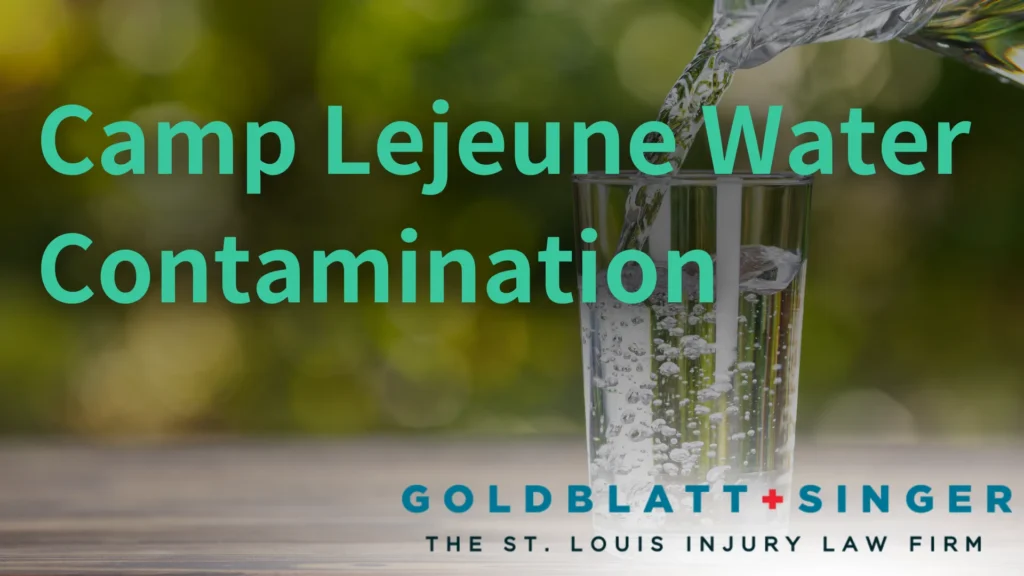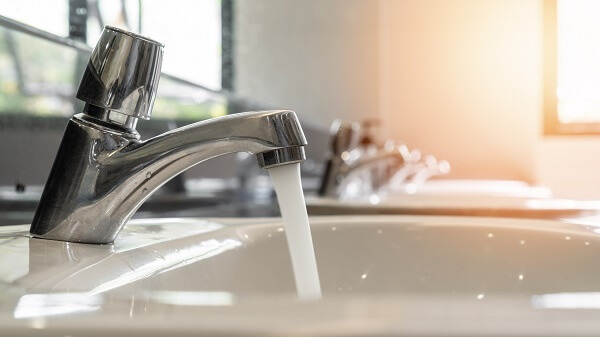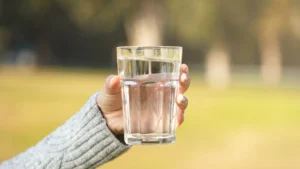
At Camp Lejeune Marine Corps Base in North Carolina, the public water supply was tainted with hazardous chemicals from 1957 until 1987. There is solid scientific evidence that thousands of military veterans and their families have developed severe illnesses and have even passed away due to long-term exposure to the hazardous substances in Camp Lejeune’s water. If you or someone you know contracted a water contamination-related illness such as cancer or another severe ailment while living or working at Camp Lejeune between 1957 and 1987, a Camp Lejeune Water Contamination lawyer at Goldblatt + Singer can help you pursue compensation.
Our Camp Lejeune personal injury lawyers in St. Louis can assist you in pursuing compensation by filing a Camp Lejeune water lawsuit as part of a mass tort. For a free consultation, please contact Goldblatt + Singer online, or call a Camp Lejeune attorney toll-free at (844) 478-5529.

Since 1949, our legal practice has fought to ensure that those victimized by unfair situations receive fair compensation. On behalf of our clients, we have successfully resolved over 25,000 cases and obtained over $550 million in compensation. To get an idea of our experience and capabilities, take a look at some of the significant cases we’ve handled in the past. Get in touch with us to receive a free case review.
At Goldblatt + Singer, we believe that forming a partnership with our clients is one of the most important aspects of our practice. Our method of compensation is straightforward: if we are unable to get a verdict that is in your favor, you won’t be responsible for paying us a dollar. This results in a relationship in which our interests complement one another, which is one of the reasons we have earned a reputation as the most reliable personal injury lawyers in St. Louis.
Potential clients must fit one of the following criteria to initiate a lawsuit:
Camp Lejeune is a large Marine Corps base and military training center in Onslow County, North Carolina. It is almost 250 square miles in size. It has served as both a military operations and training facility used by many branches of the armed services as well as a base of operations for the Marine Corps for decades. Numerous military personnel and their families have lived either temporarily or permanently at Camp Lejeune since it opened in 1942. Additionally, thousands more civilian workers and contractors have called it their home or place of employment.
Trichloroethylene (TCE) and perchloroethylene (PCE) were discovered to be contaminants in the Camp Lejeune water supply underground storage tanks in the early 1980s. The Tarawa Terrace Treatment Plant and the Hadnot Point Treatment Plant provided water for Camp Lejeune’s housing for the US Marine Corps, the barracks for single military personnel and their families, medical facilities, educational institutions, and recreational areas. Camp Lejeune has its own public water system to provide these soldiers and citizens with potable water.
From the 1950s until the 1980s, Camp Lejeune’s water supply was tainted with two distinct, dangerous chemicals: perchloroethylene (PCE) and trichloroethylene (TCE). In addition, two distinct Camp Lejeune water treatment plants that serve the base—the Hadnot Point treatment plant and the Tarawa Terrace water plant—found extraordinarily high concentrations of each of these hazardous substances.
The Hadnot Point water treatment facility in North Carolina is where the TCE contamination at Camp Lejeune took place. TCE is a liquid chemical with no smell or color employed in numerous industrial processes. For many years, the U.S. military routinely utilized TCE as a degreaser and solvent to clean massive metal weapons and equipment. The production of refrigerants also uses TCE.
According to federal law, the maximum permissible level of TCE in drinking water is five parts per billion (ppb). TCE levels as high as 1,400 ppb were discovered in the Hadnot Point plant’s water delivery lines for Camp Lejeune. Between 1953 and 1985, the Hadnot Point factory was contaminated with TCE.
At Camp Lejeune in North Carolina, PCE pollution was discovered in the Tarawa Terrance water treatment facility. The commercial dry cleaning business generally uses PCE, a transparent liquid with a moderate odor, as a fabric solvent. ABC One-Hour Cleaners, a local dry cleaner, was identified as the Tarawa factory’s source of pollution. The EPA Disease Registry has defined the maximum permissible threshold for PCE health problems in drinking water at five ppb. There was 215 ppb of PCE in the water sent from the Tarawa treatment facility to Camp Lejeune, which is 43 times the safe limit.
Studies have found a link between drinking water at Camp Lejeune that was tainted with dangerous chemicals and health problems that could be fatal, such as:
 Birth Defects
Birth DefectsIn May 2022, the U.S. House of Representatives passed a bill that makes an exception to the rule that the U.S. government is not responsible when Marine Corps service members become injured. The Camp Lejeune Justice Act of 2022 enables service members and military families to pursue monetary damages for the harm and illness they sustained due to Camp Lejeune’s tainted water. Those who drank Camp Lejeune’s drinking water can sue the U.S. government for damages in the Eastern District of North Carolina if the Senate passes the Camp Lejeune Justice Act of 2022 and the President signs it into law. Residents of Camp Lejeune who drank water from Camp Lejeune for at least 30 days between August 1, 1953, and December 31, 1987, are eligible to file a claim for disability benefits under the Camp Lejeune Justice Act.
In 2012, Congress unanimously approved H.R. 1627, often known as the Honoring America’s Veterans and Caring for Camp Lejeune Families Act. People who were diagnosed with kidney, bladder, or liver cancer, had children with birth defects, or experienced other health concerns were eligible to receive payments from the initiative. This piece of legislation would enable a family member to have access to health care benefits rather than financial awards from the Veterans Administration. Under the new law, a veteran is eligible for benefits related to their health care and their compensation from the VA.
Then, in 2017, Congress passed a new law that expanded the conditions tied to base exposure and raised the benefits associated with it. In contrast to previous efforts, the new law provides affected individuals with not only access to health care and disability payments, but also a legal avenue through which they can claim compensation for their medical ailments that are related to their exposure.
The Camp Lejeune Justice Act of 2022 prohibits the United States government from claiming special immunity from lawsuits related to Camp Lejeune. The lawsuits against Camp Lejeune include not only the service members and their families but also any former active-duty personnel, reserve personnel, or members of the National Guard who were stationed at Camp Lejeune for at least 30 consecutive days at any point during the 34-year period in question. Among the disorders that qualify for compensation include cancers of the liver and kidneys, birth defects, and other conditions linked to contaminated water.
According to the Centers for Disease Control and Prevention (CDC), the hazardous water at Camp Lejeune was likely contaminated by several sources, such as nearby industrial accidents, underground storage tanks, and an off-base dry cleaning operation, potentially exposing over 900,000 veterans, family members, and nearby residents. Despite long-standing suspicions of a problem, water testing did not reveal the sources of the contamination until the early 1980s.
Since the Camp Lejeune Justice Act of 2022 has not yet been passed by the United States Senate, there is currently no class action lawsuit regarding Camp Lejeune because such a lawsuit would be dismissed. Despite this, it is believed that the bill will pass the Senate in the near future. After the bill is passed by the Senate, victims of the Camp Lejeune incident should be prepared for a large number of lawsuits to be filed in the United States District Court for the Eastern District of North Carolina. In order to consolidate these lawsuits, a brand-new multidistrict litigation (MDL) Camp Lejeune class action will be established.
If the Camp Lejeune Justice Act is approved by the Senate, members of the armed forces who served at Camp Lejeune and who satisfy the requirements outlined above will be able to pursue their claims regarding the contamination of the water at Camp Lejeune by initiating a civil suit in the U.S. District Court for the Eastern District of North Carolina.
If your claim for injuries sustained at Camp Lejeune was denied by the Veterans Administration on behalf of you or a family member, the law offices at Goldblatt + Singer may be able to assist you in collecting the benefits you are entitled to receive from the VA. Veterans who are actively seeking assistance with their appeals addressing the contamination at Camp Lejeune are entitled to free consultations with our attorneys at this time. For further information, please contact the Camp Lejeune attorneys at Goldblatt + Singer immediately at (844) 478-5529.
Our legal firm’s personal injury team is a skilled group of litigators dedicated to representing Camp Lejeune victims in district court lawsuits involving Camp Lejeune water contamination. Again, you should contact us immediately for a free case consultation about your legal options if you or someone you know resided at or worked at Camp Lejeune between 1957 and 1987 and contracted a medical condition from contaminated water. A personal injury attorney can assist service members who want to file a Camp Lejeune lawsuit for compensation. For a free consultation, please contact Goldblatt + Singer: The St. Louis Injury Law Firm online, or call a Camp Lejeune attorney toll-free at (314) 231-4100.